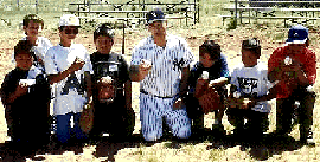 |
|
| . | . | . | WHERE ARE THEY NOW
Jack Aker
by Bill Retherford July 19, 2004 There are no signs of commerce, rarely another car in sight, and even then it’s most likely a battered pickup, probably thirty years old. For Jack Aker, one of baseball’s top relief pitchers in the 1960s and 70s, it’s like an annual pilgrimage to another world, far removed from the cheering crowds and big cities of the major leagues. For eleven years, that was his turf: 495 games, 123 saves, and a lifetime 3.28 ERA in stints with the Kansas City Athletics, Seattle Pilots, Yankees, Cubs, Braves and Mets. In Aker’s big 1966 season with KC, he was 8-4, with a 1.99 ERA and 32 saves, and was the American League’s “Fireman of the Year.” Nearly forty years later, he is in a place populated by, as he calls them, “America’s forgotten children.” Native American kids, living on Navajo, Hopi and Zuni reservations, with drug and alcohol abuse common, and teen suicide numbers three times the national rate. Aker, 64, of Native American descent himself, spends two weeks each spring holding free baseball clinics on the reservations. Sponsored by the National Indian Youth Leadership Project, a small non-profit headquartered in Gallup, New Mexico, Aker teaches the fundamentals to an appreciative group. He’s been at it ten years, and it’s never easy. “Most of the kids don’t own a glove,” says Aker, and when it comes to baseball skills, “most of them are pretty awkward.” They share what little equipment they have, and when he wraps up a clinic, Aker gives each child a baseball. During the two weeks, he travels hundreds of miles and works with about 400 children, age five and up. The girls play too, and often they’re as good as the boys. The Native American children are “way tougher than the average American kid,” says Aker. “At one clinic this year, I hit a popup that landed squarely on the head of one little ten-year-old.” None of the parents ran for an ambulance or an attorney. “The boy giggled and the other kids were laughing so hard they rolled in the dirt.” The practice fields hold little resemblance to Yankee Stadium, Wrigley Field, or Sicks Stadium in Seattle, three of Aker’s old haunts. They’re littered with rocks and burrs, with no bases or a home plate. The wind blown haze of red clay hanging in the air is so heavy Aker can barely make out the batter’s box while standing on a makeshift pitcher’s mound. There are no uniforms or umpires, no frills of any kind; but the children don’t seem to care. After retiring as a player in 1974, Aker spent ten years as a minor league manager in the Mets and Indians organizations, and worked for two years in Cleveland as pitching coach for the big club. He founded Jack Aker Baseball, Inc. in 1988, offering camps, clinics and private instruction to individuals, teams and leagues throughout the United States. Today, he teaches 3,000 students a year, from tee-ballers to 35-plus adults. Some of his players have gone on to success in baseball, and it’s not uncommon for Aker to hear from a former student: “We get them at eight years old, see them for a few years, and a decade later they’ll send us an e-mail saying, ‘Remember me? Now I’m playing college ball.’” Fair to say most of the kids on the reservations have more modest goals, dreams less grand. “After the clinic I sit them down and talk about working hard, staying in school, and steering clear of drugs and alcohol.” “I tell them to find something to devote themselves to,” he says. “Not necessarily baseball, but something you can be passionate about. That’s what I tell them. Find your passion.” Surely, Jack Aker has found his.
Bill Retherford is an Emmy and UPI award-winning journalist, book author and television producer. He can be reached at rfordprod@aol.com. . |
. | . | ||||||||
 |
|||||||||||||
| Copyright © 2005 by BaseballSavvy.com. |
